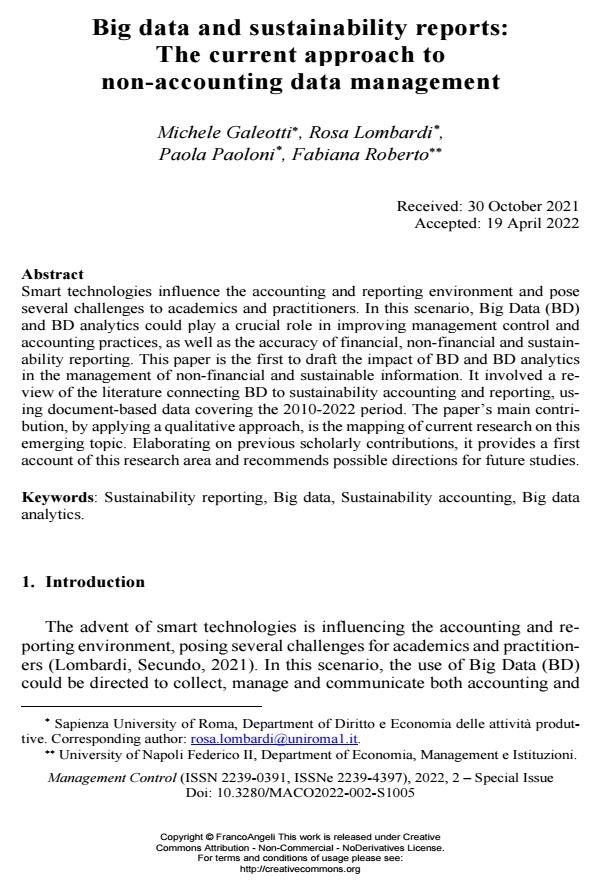Big data and sustainability reports: The current approach to non-accounting data management
Journal title MANAGEMENT CONTROL
Author/s Michele Galeotti, Rosa Lombardi, Paola Paoloni, Fabiana Roberto
Publishing Year 2022 Issue 2022/2 Suppl.
Language English Pages 22 P. 95-116 File size 380 KB
DOI 10.3280/MACO2022-002-S1005
DOI is like a bar code for intellectual property: to have more infomation
click here

FrancoAngeli is member of Publishers International Linking Association, Inc (PILA), a not-for-profit association which run the CrossRef service enabling links to and from online scholarly content.
Smart technologies influence the accounting and reporting environment and pose several challenges to academics and practitioners. In this scenario, Big Data (BD) and BD analytics could play a crucial role in improving management control and accounting practices, as well as the accuracy of financial, non-financial and sus-tainability reporting. This paper is the first to draft the impact of BD and BD ana-lytics in the management of non-financial and sustainable information. It in-volved a review of the literature connecting BD to sustainability accounting and reporting, using document-based data covering the 2010-2022 period. The paper’s main contribution, by applying a qualitative approach, is the mapping of current research on this emerging topic. Elaborating on previous scholarly contributions, it provides a first account of this research area and recommends possible directions for future studies.
Keywords: Sustainability reporting, Big data, Sustainability accounting, Big data analytics.
- Le aziende nell'era della twin transition: i sistemi di management e controllo a supporto dell'agilità e della resilienza Antonio Corvino, Marika Intenza, in MANAGEMENT CONTROL 3/2026 pp.5
DOI: 10.3280/MACO2025-003001 - The Determinants of TCFD Reporting: A Focus on the Italian Context Salvatore Principale, Simone Pizzi, in Administrative Sciences /2023 pp.61
DOI: 10.3390/admsci13020061 - Enhancing sustainability reporting practices in the notebook manufacturing industry: a multifaceted analysis integrating traditional reports and social media data Mehrdad Maghsoudi, Sajjad Shokouhyar, Nafiseh Sanaee, Sina Shokoohyar, in Annals of Operations Research /2025 pp.317
DOI: 10.1007/s10479-024-06343-4 - Environmental, Social, Governance (ESG) Domenica Lavorato, Palmira Piedepalumbo, Rita Lamboglia, pp.621 (ISBN:978-3-031-76617-6)
- La pianificazione della sostenibilità nelle aziende familiari: il ruolo dei key value drivers Ivo Hristov, Antonio Chirico, Francesco Ranalli, Riccardo Camilli, in MANAGEMENT CONTROL 3/2022 pp.109
DOI: 10.3280/MACO2022-003006 - Controllo di gestione e relazioni intraorganizzative: la prospettiva del controller Oppi Chiara, Vagnoni Emidia, Cattaneo Cristiana, Galizzi Giovanna, in MANAGEMENT CONTROL 3/2024 pp.155
DOI: 10.3280/MACO2024-003008
Michele Galeotti, Rosa Lombardi, Paola Paoloni, Fabiana Roberto, Big data and sustainability reports: The current approach to non-accounting data management in "MANAGEMENT CONTROL" 2 Suppl./2022, pp 95-116, DOI: 10.3280/MACO2022-002-S1005